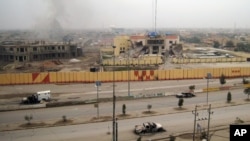Black-clad al-Qaida militants in Iraq appeared to seize control of the embattled western city of Fallujah on Friday, raising their flag over government buildings and declaring an independent Islamic state.
Witnesses said the Sunni militants, members of the Islamic State of Iraq and Syria, or ISIS, cut power lines in the city late in the day and ordered residents not to use backup generators.
But the chief of Fallujah police, Mohamed al-Isawi, disputed the ISIS claims of control, telling The New York Times newspaper that he was repositioning his forces north of the city for a decisive battle. He said his personnel had been strengthened by an alliance of tribal leaders, and that part of a main street had been recaptured by late in the day.
A local journalist who asked for anonymity out of fear of retribution told The Washington Post that police and other government-aligned forces had abandoned the city and that al-Qaida had burned all Iraqi national flags.
Fighting across the vast open spaces of western Iraq has become a severe test of Prime Minister Nuri al-Maliki's ability to hold the country together and prevent full-scale civil war.
Meanwhile, in the al-Anbar provincial capital, Ramadi, a tribal leader who fought alongside U.S. troops in 2007 told The Washington Post his fighters had joined police in ejecting al-Qaida loyalists. He said the regional ISIS leader, Abdul Rahman al-Baghdadi, was among those killed in the fighting.
The explosion of violence in western Iraq is pitting al-Qaida-linked Sunni extremists, who now control large swaths of the region west of Baghdad, against forces of the Shi'ite-dominated central government. Government forces in the west are backed by local tribesmen who have chosen to align themselves with Baghdad rather than with ISIS fighters.
Al-Anbar province was the center of the Sunni insurgency during the eight-year presence of U.S. military forces, which withdrew from the country in December 2011. More than 1,300 U.S. military personnel were killed in the region.
Witnesses said the Sunni militants, members of the Islamic State of Iraq and Syria, or ISIS, cut power lines in the city late in the day and ordered residents not to use backup generators.
But the chief of Fallujah police, Mohamed al-Isawi, disputed the ISIS claims of control, telling The New York Times newspaper that he was repositioning his forces north of the city for a decisive battle. He said his personnel had been strengthened by an alliance of tribal leaders, and that part of a main street had been recaptured by late in the day.
A local journalist who asked for anonymity out of fear of retribution told The Washington Post that police and other government-aligned forces had abandoned the city and that al-Qaida had burned all Iraqi national flags.
Fighting across the vast open spaces of western Iraq has become a severe test of Prime Minister Nuri al-Maliki's ability to hold the country together and prevent full-scale civil war.
Meanwhile, in the al-Anbar provincial capital, Ramadi, a tribal leader who fought alongside U.S. troops in 2007 told The Washington Post his fighters had joined police in ejecting al-Qaida loyalists. He said the regional ISIS leader, Abdul Rahman al-Baghdadi, was among those killed in the fighting.
The explosion of violence in western Iraq is pitting al-Qaida-linked Sunni extremists, who now control large swaths of the region west of Baghdad, against forces of the Shi'ite-dominated central government. Government forces in the west are backed by local tribesmen who have chosen to align themselves with Baghdad rather than with ISIS fighters.
Al-Anbar province was the center of the Sunni insurgency during the eight-year presence of U.S. military forces, which withdrew from the country in December 2011. More than 1,300 U.S. military personnel were killed in the region.





